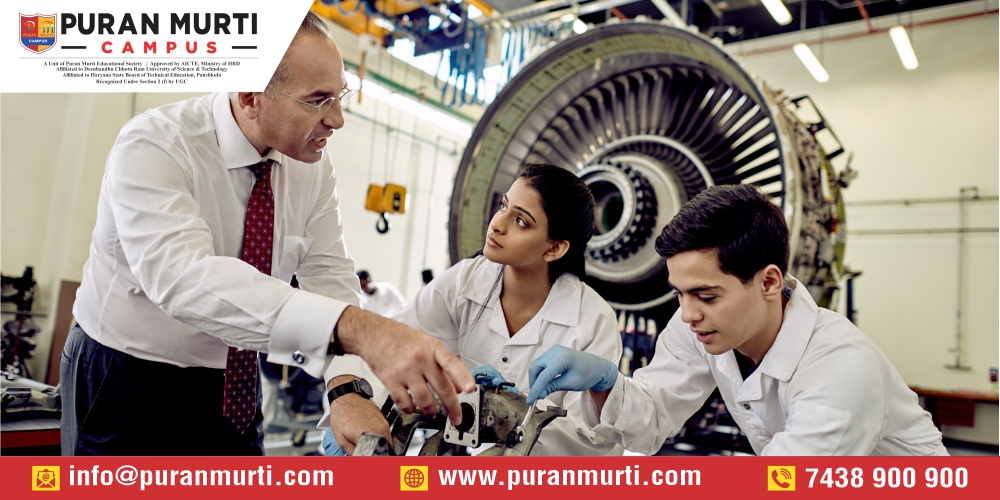Precision and Skill: The Art of Aircraft Maintenance Engineering
Posted on : 1 July, 2024 2:35 pm
Introduction
- Aircraft Maintenance Engineering is a vital field that ensures the safety, reliability, and efficiency of aircraft operations. This discipline involves the meticulous inspection, repair, and maintenance of aircraft components, systems, and structures. Aircraft maintenance engineers are responsible for diagnosing mechanical and electrical issues, performing routine maintenance checks, and adhering to stringent regulatory standards. Their expertise is crucial in preventing accidents, minimizing downtime, and enhancing the overall performance of aircraft. As the aviation industry continues to grow, the demand for skilled aircraft maintenance engineers remains high, making this a rewarding and impactful career choice.
Core Skills for Aircraft Maintenance Engineers
- Core skills for aircraft maintenance engineers include technical proficiency in diagnosing and repairing mechanical and electrical systems, attention to detail for thorough inspections, and strong problem-solving abilities. They must also possess excellent communication skills for reporting issues and coordinating with teams, and a deep understanding of regulatory compliance to ensure all maintenance activities meet safety standards.
Understanding Aircraft Systems
- Understanding aircraft systems involves comprehensive knowledge of various components such as engines, avionics, hydraulics, and electrical systems. Maintenance engineers must be adept at troubleshooting and maintaining these systems to ensure optimal performance and safety. This includes routine inspections, preventive maintenance, and timely repairs to prevent malfunctions and enhance the aircraft’s reliability and efficiency.
Hands-On Training and Practical Experience
- Hands-on training and practical experience are crucial for aircraft maintenance engineers. This involves working directly on aircraft under the supervision of experienced professionals, learning to use specialized tools, and understanding maintenance protocols. Real-world experience helps engineers develop the skills necessary to perform accurate diagnostics, repairs, and maintenance, ensuring aircraft safety and compliance with regulatory standards.
Technological Tools and Equipment
- Aircraft maintenance engineers utilize advanced technological tools and equipment, including diagnostic software, electronic testing devices, and precision instruments. These tools help in accurately identifying issues, ensuring proper repairs, and maintaining aircraft performance. Familiarity with these technologies is essential for efficient maintenance operations, allowing engineers to keep up with the latest advancements and uphold safety standards in the aviation industry.
Routine Maintenance Procedures
- Routine maintenance procedures for aircraft include regular inspections, system diagnostics, and component replacements. Engineers check critical systems like engines, hydraulics, and avionics for wear and tear, ensuring all parts function optimally. Scheduled maintenance helps prevent potential issues, enhances safety, and extends the aircraft’s operational life, adhering to strict industry standards and regulatory requirements.
Troubleshooting and Problem-Solving Techniques
- Troubleshooting and problem-solving techniques in aircraft maintenance involve systematic diagnostics, identifying and isolating faults, and applying corrective measures. Engineers use advanced tools and diagnostic software to detect issues, interpret error codes, and perform repairs. This process ensures efficient resolution of technical problems, maintaining aircraft safety, performance, and compliance with aviation standards.
Regulatory Standards and Compliance
- Regulatory standards and compliance in aircraft maintenance ensure safety and reliability. Engineers must adhere to guidelines set by aviation authorities like the FAA or EASA. This includes regular inspections, maintenance protocols, and thorough documentation. Compliance ensures that all maintenance activities meet legal and safety requirements, minimizing risks and enhancing the overall safety of aircraft operations.
The Importance of Attention to Detail
- Attention to detail is crucial in aircraft maintenance engineering. Each component must be meticulously inspected and serviced to ensure safety and reliability. Small oversights can lead to significant issues, impacting aircraft performance and passenger safety. Precision in every task, from routine checks to major repairs, is essential to maintain high standards and prevent potential hazards.
conclusion
- Aircraft maintenance engineering demands precision, skill, and a commitment to safety. The role is critical in ensuring the reliability and performance of aircraft, requiring a deep understanding of systems, rigorous hands-on training, and adherence to regulatory standards. With the ever-evolving nature of aviation technology, continuous learning and adaptability are essential. By mastering these elements, aircraft maintenance engineers play a vital role in the aviation industry, ensuring that every flight is safe, efficient, and dependable. Their dedication and expertise safeguard the skies for all.

